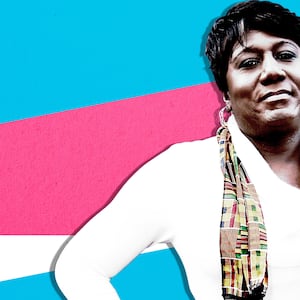Given the incomprehensible and still rising death toll of 210,000 Americans from COVID-19, one might understand how the violent deaths of 31 transgender and gender non-conforming Americans might fall between the cracks of public consciousness and concern. But friends mourning Felycya Harris in Augusta, Ga., have vowed to remember her, and say her name.
“Everybody’s going to remember Felycya,” said a friend, Ricola Collier, to a WRDW-TV reporter. “That laugh. The smile—the smiles. The talks. The arguments. The attitudes. Everybody is going to remember who Felycya Harris is.”
According to the Augusta Chronicle and other reports, Harris taught dance and was a self-employed interior decorator.
ADVERTISEMENT
In the hours before Harris was murdered last weekend, Collier said she was with her: “We were just sitting in the car, laughing and talking and jiving on each other.”
Harris’s body was found in Meadowbrook Park at 2:35 p.m. Saturday, shot one time. The coroner ruled her death a homicide, making her the 31st victim of anti-transgender violence in the United States in 2020. Most of the victims, like Harris, were Black or Latinx. Two other trans people were killed in that area within the past year, according to WRDW-TV.
Richmond County police are looking for a suspect.
But who is looking to stop the ongoing violence against this marginalized community here and around the world?
The Human Rights Campaign pointed out Harris’ murder is the fourth violent death of a transgender or gender non-conforming person in the U.S. in just three weeks. Also, in recording Harris as the 31st transgender or gender non-conforming American to meet a violent death, HRC underscores that number is the absolute minimum.
“We say ‘at least’ because too often these deaths go unreported—or misreported by failing to identify the victim as trans or by misgendering and misnaming the victim,” an HRC spokesperson said in a statement, noting there were indeed local media reports that misidentified Harris, laying bare a lack of training and interaction with the transgender community.
Once they got her name and gender right, news outlets across the country highlighted that Harris’ murder meant that the highest number of violent deaths ever tracked in one year, 31, had been reached—equaling the death toll of 2017. And unfortunately, the hell that has been the year 2020 still has close to three more months left.
That’s three more months in which the death tolls for both COVID-19 and trans victims can grow. Next month, we’ll mark the Transgender Day of Remembrance again, and I’m dreading it. I’m reminded of Panic At The Disco’s “This Impossible Year,” except that there should be a new verse given all we have endured.
So much tragedy
This impossible year
Only bloodshed and bodybags
And vigils full of tears
We light candles and wallow
In our sorrow far and near

Felycya Harris
Photo Illustration by The Daily Beast/Facebook“With news of the death of Felycya Harris, we have hit a grim milestone,” said HRC President Alphonso David in a statement on HRC’s website. “This epidemic of violence, which is particularly impacting transgender women of color, must and can be stopped. We must work to address the factors that underpin this culture of violence and openly discuss how the intersection of racism, sexism, homophobia, biphobia and transphobia work to deprive transgender and gender non-conforming people of equal access to opportunity and necessities like employment, housing and health care.”
What David is hinting at is that a federal law enacted in April 2018 made life for sex workers significantly harder and more dangerous, and that the lack of good paying jobs for trans women often drives them to sex work, which is inherently risky and can lead to violence.
Something else that needs urgent consideration: what Samantha Allen wrote about in The Daily Beast in 2017, examining why straight men feel shame in dating trans women, and sometimes panic, even react violently, once they are informed or realize their attraction.
It might seem like semantics but it’s not really an epidemic at all, despite what David said and what the American Medical Association said in 2019, when it labeled the spate of hate against trans people an “epidemic,” according to The New York Times. That’s because epidemics spread within communities or regions. Deadly violence against trans and gender non-conforming individuals is, in fact, a pandemic, which is defined by its spread across countries or regions. Like coronavirus.
Admittedly, the death tolls are incomparable, but reports from around the world show the pandemic of murders of trans people stretches far beyond the estimated U.S. population of over 1.4 million.
Reuters reported last month that the murders—and suicides—of trans people in Brazil has risen 70 percent in just the past year, making the South American nation the deadliest place on earth to be trans.
In a separate report last November, Reuters said Mexico came in second, followed by the United States. Radio Free Europe recently detailed the horrors of being trans in Russia, where gruesome murders and discrimination run rampant. So, this is an international plague, or a pandemic.
And not all the violence is deadly. The Los Angeles Times reports a trans Latina woman named Daniela Hernandez is in a Los Angeles hospital, recovering from multiple stab wounds including a slash across her neck. Police are looking for two men and a woman who attacked Hernandez Sunday night in MacArthur Park, in L.A.’s Westlake neighborhood. They reportedly shouted, “We don’t want gays here,” KNBC-TV reported.
The LAPD are reportedly investigating the incident as a hate crime. The TransLatina Coalition issued a statement: “We are filled with relief and happy that Daniela is still with us today, but outraged with the lack of respect for trans lives."
HRC says, “We must all work to cultivate acceptance, reject hate and end stigma. We cannot achieve full equality if members of the trans community live with the fear that to live their best life, they must risk losing their life.”
“It is heartbreaking every time we hear about the loss of another transgender or non-binary or gender non-conforming individual to this pandemic of violence,” Casey Pick, senior fellow for advocacy and government affairs at The Trevor Project, told The Daily Beast. “We know that this constant drumbeat affects the LGBTQ youth that we serve. They are aware of this violence and it does cause a culture of fear within the community that we do all we can to offer comfort and support.”
To those who say those murdered that were engaged in sex work got what they deserved—and people do say this—Pick responds, “Who a person is or what they do or how they make a living, none of that is a justification for murder. I find it appalling anytime somebody tries to devalue another life for whatever reason.
“We know that transgender people are subject to tremendous workplace discrimination. They experience tremendous rates of poverty and homelessness. And so, yes, all of these things contribute to greater vulnerability to violence. But that certainly isn't a reason to excuse or justify the violence. That's a reason to take real action, to put an end to the discrimination that makes people vulnerable in the first place.”
That discrimination comes straight from Washington, D.C., where the Trump administration has made it official policy: banning trans troops, removing protections from health care discrimination, and threatening schools that provide equal opportunities in athletics and fitness to transgender children.
Voting out this current regime on November 3 will not end the hate or stop discrimination. But it will send a message that as Americans we stand against the policies that provide aid and comfort to those who embrace hate.






